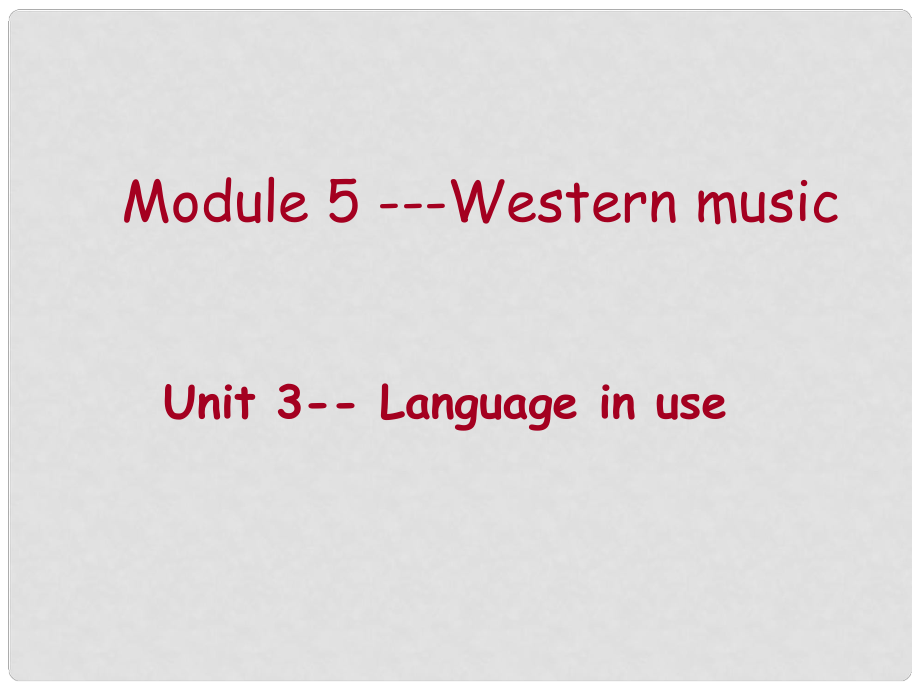《八年級(jí)英語(yǔ)上冊(cè) Module 5 Unit 3 Language in use課件2 外研版》由會(huì)員分享�,可在線閱讀�,更多相關(guān)《八年級(jí)英語(yǔ)上冊(cè) Module 5 Unit 3 Language in use課件2 外研版(14頁(yè)珍藏版)》請(qǐng)?jiān)谘b配圖網(wǎng)上搜索�。
1、Module 5 -Western musicUnit 3- Language in use反意疑問(wèn)句反意疑問(wèn)句 1.反意疑問(wèn)句的意義及其構(gòu)成反意疑問(wèn)句的意義及其構(gòu)成 反意疑問(wèn)句是指當(dāng)提問(wèn)的人對(duì)前面所敘述的事實(shí)不敢肯定�,反意疑問(wèn)句是指當(dāng)提問(wèn)的人對(duì)前面所敘述的事實(shí)不敢肯定,而需要向?qū)Ψ郊右宰C實(shí)時(shí)所提出的問(wèn)句�。而需要向?qū)Ψ郊右宰C實(shí)時(shí)所提出的問(wèn)句。其結(jié)構(gòu)為:前一其結(jié)構(gòu)為:前一部分是一個(gè)陳述句�,后一部分是一個(gè)簡(jiǎn)短問(wèn)句。簡(jiǎn)短由部分是一個(gè)陳述句�,后一部分是一個(gè)簡(jiǎn)短問(wèn)句。簡(jiǎn)短由“助動(dòng)詞助動(dòng)詞/情態(tài)動(dòng)詞或系動(dòng)詞情態(tài)動(dòng)詞或系動(dòng)詞be(肯定或否定)(肯定或否定)+主語(yǔ)(代主語(yǔ)(代詞)詞)”構(gòu)成�。構(gòu)成。2.反意疑問(wèn)
2�、句構(gòu)成應(yīng)注意以下幾點(diǎn):反意疑問(wèn)句構(gòu)成應(yīng)注意以下幾點(diǎn): 1)前面如果是肯定的,簡(jiǎn)短問(wèn)句就要用否定形式�;如果是)前面如果是肯定的,簡(jiǎn)短問(wèn)句就要用否定形式�;如果是否定的,簡(jiǎn)短問(wèn)句就用肯定形式�。否定的,簡(jiǎn)短問(wèn)句就用肯定形式�。 2)簡(jiǎn)短問(wèn)句中的謂語(yǔ)動(dòng)詞在人稱和時(shí)態(tài)上要與前面陳述句)簡(jiǎn)短問(wèn)句中的謂語(yǔ)動(dòng)詞在人稱和時(shí)態(tài)上要與前面陳述句的謂語(yǔ)動(dòng)詞保持一致。的謂語(yǔ)動(dòng)詞保持一致�。 3)簡(jiǎn)短問(wèn)句中的主語(yǔ)必須是代替前面主語(yǔ)的代詞。簡(jiǎn)短問(wèn)句中的主語(yǔ)必須是代替前面主語(yǔ)的代詞。 e.g I find English very interesting, dont I? They can speak Japanese, cant
3�、 they? You have been to Beijing, havent you? They didnt like eating fish, did they?4) 當(dāng)前面陳述部分的主語(yǔ)是當(dāng)前面陳述部分的主語(yǔ)是everybody, everyone, someone, no one, nobody, somebody等表示人的不定代詞時(shí),簡(jiǎn)等表示人的不定代詞時(shí)�,簡(jiǎn)短短問(wèn)問(wèn)句部分中的主語(yǔ)常用句部分中的主語(yǔ)常用they Everyone has been there, havent they?每個(gè)人都去過(guò)那里,是嗎�?每個(gè)人都去過(guò)那里�,是嗎?5)當(dāng)前面陳述部分的主語(yǔ)是)當(dāng)前面陳述部分的主語(yǔ)是e
4�、verything, anything, nothing, something等表物的不定代詞時(shí),簡(jiǎn)等表物的不定代詞時(shí)�,簡(jiǎn)短短問(wèn)句部分的主語(yǔ)常用問(wèn)句部分的主語(yǔ)常用it.如:Nothing is wrong with the machine, is it?這臺(tái)機(jī)器沒(méi)出什么毛病,是吧�?這臺(tái)機(jī)器沒(méi)出什么毛病,是吧�?6)當(dāng)前面陳述部分是)當(dāng)前面陳述部分是there be結(jié)構(gòu)時(shí),簡(jiǎn)結(jié)構(gòu)時(shí)�,簡(jiǎn)短短問(wèn)句部分用問(wèn)句部分用there, 省略主語(yǔ)代詞。省略主語(yǔ)代詞�。如:如:There is something wrong with the machine, isnt there?機(jī)器出了毛病了,是嗎�?機(jī)器出了毛病
5、了�,是嗎?7) 當(dāng)陳述部分含有當(dāng)陳述部分含有seldom, hardly, never, few, little, nothing等否定詞或半否定詞時(shí)�,簡(jiǎn)等否定詞或半否定詞時(shí),簡(jiǎn)短短問(wèn)句部分的動(dòng)詞應(yīng)用肯問(wèn)句部分的動(dòng)詞應(yīng)用肯定形式定形式。 Few people know him, do they?沒(méi)幾個(gè)人認(rèn)識(shí)他�,是嗎?沒(méi)幾個(gè)人認(rèn)識(shí)他�,是嗎?8) 當(dāng)陳述部分含有的當(dāng)陳述部分含有的 have是實(shí)義動(dòng)是實(shí)義動(dòng) 詞時(shí)�,則簡(jiǎn)詞時(shí),則簡(jiǎn)短短問(wèn)句部分問(wèn)句部分 應(yīng)需借助助動(dòng)詞應(yīng)需借助助動(dòng)詞do, does, did等來(lái)完成�。等來(lái)完成。如:如:They had milk and bread for breakfa
6�、st, didnt they?他們?cè)绮统缘拿姘鹊呐D蹋菃??他們?cè)绮统缘拿姘鹊呐D蹋菃幔?)陳述部分是祈使句時(shí)�,簡(jiǎn))陳述部分是祈使句時(shí),簡(jiǎn)短短問(wèn)句部分常用問(wèn)句部分常用will you.(但是(但是 以以Lets開(kāi)頭的�,簡(jiǎn)開(kāi)頭的,簡(jiǎn)短短問(wèn)句部分常用問(wèn)句部分常用 shall we )如:Dont go there, will you? 別去那里�,好嗎?別去那里�,好嗎? Lets go skating, shall we? 我們?nèi)セ?,好嗎?我們?nèi)セ?,好嗎?反意疑?wèn)句的答語(yǔ)反意疑問(wèn)句的答語(yǔ)在回答反意疑問(wèn)句時(shí)�,應(yīng)根據(jù)事實(shí)來(lái)回答,如果事實(shí)是肯在回答反意疑問(wèn)句時(shí),應(yīng)根據(jù)事實(shí)來(lái)回答�,如果事實(shí)是肯定的
7、�,前面要用定的,前面要用yes,否則用否則用no, 在第一部分為否定句時(shí)要特別在第一部分為否定句時(shí)要特別注意�,這時(shí)英語(yǔ)回答和漢語(yǔ)回答是不一致的。注意�,這時(shí)英語(yǔ)回答和漢語(yǔ)回答是不一致的。如:如:-You are not going out today, are you?-No, I am not.你今天不出去�,是嗎�?你今天不出去,是嗎�?是的,我今天不出去�。是的,我今天不出去�。(“不出去不出去”屬于否定的事實(shí),所以在英語(yǔ)中應(yīng)用屬于否定的事實(shí)�,所以在英語(yǔ)中應(yīng)用“no”來(lái)來(lái) 表表示此義,不要用示此義�,不要用 “yes”來(lái)回答。)來(lái)回答�。)Match the sentences with the que
8、stion tags.1.He has written ten new songs this year, a. cant we?2.He wrote traditional music�, b. didnt he? 3.She was a musician, c. do you?4.We can practise after school, d. have they?5.You dont like this song much, e. is it?6.They have never been to any concert, f. hasnt he?7.This music isnt very p
9、opular, g. doesnt he? 8.He has a lot of CDs, h. wasnt she?Write the missing question tags. ASally: Hi, John! Its a lovely day, (1)_?John: Yes, it is. Youre going on holiday today, (2)_?Sally: Thats right. I told you last week, (3)_?John: Yes, you did. You didnt get my message last night, (4)_?Sally:
10、 No, didnt. You didnt call me, (5)_?John: Yes, I called about eight. Maybe you didnt hear the phone. BKaty: You like blues music, (1)_?Jenny: Yes, I do. I play the guitar, so I play a lot of blues music. You can play the guitar, (2)_?Katy: No, I cant. Actually, Im a singer. I dont play any instrumen
11�、ts. You didnt come to my last concert, (3)_?Jenny: No. I was busy that day. Your next concert is on Saturday, (4)_?Katy: Yes, thats right. You are coming, (5)_?Jenny: Yes, of course!isnt itarent youdidnt Idid youdid youdont youcant youdid youisnt itarent yousingercomposeroperarockmusicianPut the wor
12、ds into the correct columnTypes of musicInstrumentsPeoplesinger Blues classical pop rock opera guitar piano trumpet violin composer musician jazzBlues Classical pop jazz Rock operaguitarpianotrumpet violincomposersingermusicianComplete the passage with the words we talked about just now.Mozart was a
13�、 composer . He wrote (1)_music and (2)_. His music is difficult to play and sing. Musicians and (3)_ train for a long time before they can play and sing Mozarts music, but (4)_ and rock musicians dont train much. Their most popular instrument is the (5)_.In America, black musicians often sing sad so
14、ngs. They call this musicthe(6)_. Another type of modern music from America is(7)_. This music often uses (8)_and other loud instruments. We use(9)_ and violin to play all types of music.classicaloperassingerspopguitarbluesjazztrumpetspianoDo you know this man?Elvis Aaron Presley (貓王貓王)Read the pass
15�、age and answer the questions.1.How long did Elvis live in Memphis?2.What kind of music did Elvis like when he was a young child?3.Where did he get his guitar?4.Why does the writer say Elvis was lucky because a guitar has only six string?5.Do you think Elvis was an artist? Why?He lived in Memphis for
16、 29 years.GospelHe got the guitar from his father.Because the guitar had no strings and he had to do a part-time job and bought one string a month.Yes, because he was the biggest rock singer; he made lots of films; he hot his own TV show and gave a very successful concert8. Listen and answer the que
17�、stions.1. Where does Amy study?2. What does she think can help people understand music of any kind?3.What kind of music doesnt Amy like?4.How did her interest in classical music start?5.Who doesnt mind classical music?6.What kind of music did she try hard to enjoy?At Purcell School.Listening to it more carefully and trying to find out about it.RapBy listening to it playing at home when she was a childMany of Amys friends.Rock musicThankyou Bye
 八年級(jí)英語(yǔ)上冊(cè) Module 5 Unit 3 Language in use課件2 外研版
八年級(jí)英語(yǔ)上冊(cè) Module 5 Unit 3 Language in use課件2 外研版

